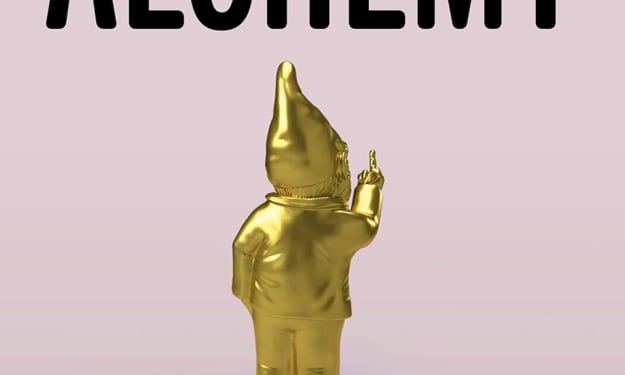Everything Is Falling Apart & I Can't Stop Watching Video Game Fails
The case for why withdrawal can sometimes be healthy

Things are pretty bad right now. Fascism has been shockingly on the rise for years. Homophobic and transphobic laws are making the rounds in the US and the UK. Roe v. Wade was overturned in the US. And on top of all this, wealth inequality has metastasized, and the climate has deteriorated due to human activity.
So what have I been doing in response to this vague existential malaise? I have been watching video game fails, of course. I have been reveling in players completely humiliating themselves on stream. For a while now, I have devoted daily hours to completely withdrawing from the world, which has been fantastic.
I want to make a case for why this coping mechanism is not only okay but healthier than just consuming the news or scrolling through Twitter on repeat. Let's talk about the glory of video game fails and why your “turtling” (i.e., withdrawing from the world) is okay.
Now I don't just watch video game fails — I love them. I adore seeing players accidentally stumbling into some glitch or just pressing the wrong button and losing all their progress. It's fun to watch someone get close to their goal and then witness it all tumbling down. The Germans call taking pleasure in the suffering of others “schadenfreude,” and boy, does it help me get through life.
Speed runs (i.e., when a player tries to beat a game under certain conditions as quickly as possible) are great for this feeling. You will get players who have spent months, years even, memorizing the mechanics of a game. These people have gone down to the code level to exploit an element of the game to shave minutes, maybe even seconds, off of their time. They will spend up to hours doing a single playthrough, doing everything right, and then getting to that moment where they need to utilize a specific exploit — only to make one wrong move and fail. Hours of work down the drain in seconds.
These failures are just perfection to me. Seeing players fail so spectacularly allows me to feel better about myself. I externalize all my pain safely onto this random stranger, and I do not feel stressed or worried at that moment.
Other times it's not even the failure I care about but just watching the player's suffering. For a while now, I have been consuming a YouTuber named Enter the Unown (a Pokepun). Their gimmick is Pokemon playthroughs but under absurd conditions. Sometimes he will beat entire games with a single, terrible Pokemon. Other times he will severely limit his move sets. Whatever the task, it's always deliciously overly constrained.
Watching Enter the Unown, you can tell that these videos take him a very long time to make. Sometimes he will have to run through a game dozens, if not hundreds of times, all to make a 30-minute video I'll forget about in a couple of days. He must spend dozens of hours doing these tedious run-throughs, which doesn't include the hours he commits to editing and research. He's certainly not shy about how painful this time commitment is on camera, and for me, that futility and misery are part of my enjoyment.
Another variant of this "misery-watching" is the YouTuber Let's Game It Out, where he purposefully tries to exploit programming within a game to do ridiculous things. He will repetitively exploit flaws in the code of a game to destroy fictional kitchens or make a make-believe hospital increase its death rate.
Yet part of this enjoyment is his suffering too. There will be edits where he indicates the number of hours that will pass for him to exploit a pointless glitch — 3, 6, or 8 hours will go by so that he can make a thousand ores or glitch the number of giraffes in a tile. This means half the humor is laughing at how many hours he has wasted on performing a pointless task. His suffering is also part of the fun.
I don't think I am the only one who experiences this type of schadenfreude. I know I am not. These YouTubers sometimes get hundreds of thousands, if not millions of views, based on the comments. I see people there for the same reason I am. "I appreciate your dedication to suffering through the slow torture of little to no frame rates, just to create this madness," writes one user in a Let's Game It Out video. "I love this, I love the existential crisis people might have in games, and their pain only helps my ego," another user says of Let's Game It Out's attempt to build a prison where "Being Alive Is Optional."
Truthfully I see a lot of Americans misery-watching with me — withdrawn and tired. Maybe you binge a contest show, voyeuristically taking on the role of the judge as you watch contestants squirm for money. Perhaps you judge people making a fool of themselves on reality TV. Many of us use this content as a coping mechanism, and I think that is perfectly healthy in dark times like these.
Listen, I am not one of those doomer types who is disconnected from the world around them. I donate. I participate in protests and mutual aid. I do other activities that I will not be listing for reasons. I even vote. Hell, I recently coordinated a blitz of articles for my local mayoral election.
I am very connected to my surroundings and my local politics, but for my sanity, I also need to find outlets where I can safely disconnect as well because I cannot take the insanity of this moment at all times. It's too much for me, and I know many people are equally burnt out by this vague existential dread that seems to have overtaken every aspect of our society. As influencer Sam Sedar remarked recently: "[Regarding collapse] I've had more conversations [about it] I feel like, in the past, I don't know, six weeks [than ever before]. There's a pre-apocalyptic feeling that is out there."
Now there are several things that you can do in response to that feeling:
- As we have said, you can let it overtake you, becoming a doomer who proselytizes about the end times.
- You can ignore that it's happening, engaging in a cult of toxic positivity, where you try to devote yourself even more thoroughly to the systems that are killing us.
- Or you can recognize that things suck and fight to change them.
While that last option sounds wonderful (go changing things!) from personal experience, it is also exhausting. You can burn out quickly if all you do is fight to improve the world. Many activists have thrown themselves into a cause only to come out the other end burnt and crispy.
And so in those moments where I want to change things but don't have the energy to, I watch video game fails, cathartically observing others hurt for me, because that is at least something I can control. I tell myself there is always tomorrow to fight for the world, and I let myself fall into the numbness of the Internet.
Remarkably, it's allowed me to have the capacity to do even more activism than before. I am more connected than at any point in my life, and on top of medication and therapy, part of this success has been permitting myself to tune out the world. I have limited my intake of national (though not local) news and reduced my social media usage because I don't have the capacity for it. Instead of learning about the War in Ukraine or Monkeypox or whathaveyou, I put on video game fails until I am in the right headspace to process it. And sometimes, I decide I don't need to learn about this information—instead, I focus on my friends and family, my creative endeavors, and local activism.
You may say that's cowardly, but personally, I am not going to give people a hard time for doing it. Nor will I condescend to someone and say they can push through this feeling by merely getting involved, doing therapy, taking medication, or consuming less national news. They should do all those things, but they are not a cure-all. They will not help with this dread, at least not entirely. I do all those things and more, which hasn't helped me because the sense of dread I, and most likely you, feel now is valid.
The world is falling apart, and occasionally, it's okay to let yourself feel that. We are allowed to think that things are not okay: admitting that you are sometimes drained won't turn you into a misanthrope or nihilist. Depending on your circumstances, it can be incredibly healthy to acknowledge that things are f@$#ed.
We are in a period of chaotic transition. It might not go on forever. There is always a chance that things will improve (hope is not dead, yadda yadda yadda), but there's also a chance that, well, things will get much worse. Compared to the people reacting to this reality by shooting up a school or collapsing into immobilizing despair, deadening yourself temporarily by watching meaningless content on YouTube or Netflix (or whatever it is you end up doing) is okay.
Sometimes you have to numb yourself, just a little bit, to get through a period of tremendous stress. It's why our bodies do this in the first place. If you feel like turtling, your body might be trying to protect you — listen to it.
If this withdrawal is only temporary, go ahead and retreat from the world. You might be surprised by how much more energy you have when you plug back in.
About the Creator
Alex Mell-Taylor
I write long-form pieces on timely themes inside entertainment, pop culture, video games, gender, sexuality, race and politics. My writing currently reaches a growing audience of over 10,000 people every month across various publications.






Comments (3)
Well written
I thoroughly enjoyed this piece. Your descriptions are so vivid.
Great writing